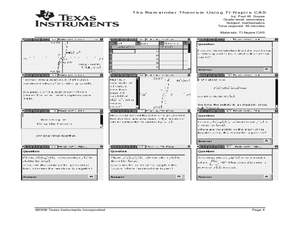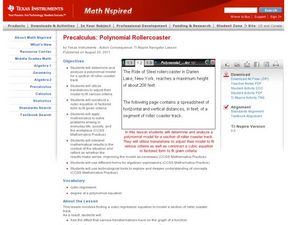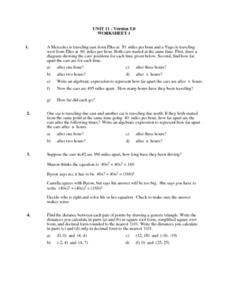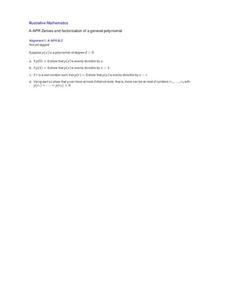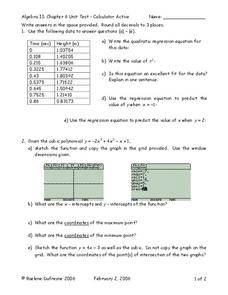Curated OER
Does Order Really Matter?
Investigate the order of operations! Learners participate in interactive multi-media activities to examine and solve multi-step equations, inequalities. They evaluate formulas and simplify monomials and polynomials.
Curated OER
Factoring: All Techniques Combined (Hard)
In this Algebra II worksheet, 11th graders combine all factoring techniques to factor polynomials completely. The two page worksheet contains eighteen problems. Answers are provided.
Curated OER
Reducing Fractions to Lowest Terms
In this Algebra I/Algebra II worksheet, students reduce algebraic fractions to lowest terms. The one page worksheet contains a combination of eleven multiple choice and free response problems. Answers are provided.
Curated OER
Sums and Difference of Cubes
Learners factor polynomials using the sum and difference of cubes. They also learn connections between the graph and expression.
Curated OER
The Remainder Theorem Using TI-Nspire CAS
Investigate the Remainder Theorem in this algebra lesson. Explore the relationship between the remainders of polynomial division and the function. Each of the four problems gets progressively more complicated. This might be a great...
EngageNY
Comparing Methods—Long Division, Again?
Remember long division from fifth grade? Use the same algorithm to divide polynomials. Learners develop a strategy for dividing polynomials using what they remember from dividing whole numbers.
EngageNY
Dividing by (x – a) and (x + a)
Patterns in math emerge from seemingly random places. Learners explore the patterns for factoring the sum and differences of perfect roots. Analyzing these patterns helps young mathematicians develop the polynomial identities.
EngageNY
The Remainder Theorem
Time to put it all together! Building on the concepts learned in the previous lessons in this series, learners apply the Remainder Theorem to finding zeros of a polynomial function. They graph from a function and write a function from...
Curated OER
Exponential Growth versus Linear Growth II
Your algebra learners discover that exponential functions, with a base larger than one, outgrow linear functions when the inputs increase sufficiently. Their analysis includes using a graphing calculator to produce tables.
University of North Texas
Math Exam 1 Review
Perfect as a review guide, this activity provides a range of questions focusing on functions. Topics include composing functions, transformations, domains, and polynomials. Also included are corresponding worksheets focusing on other...
Curated OER
Polynomial Rollercoaster
Learners relate polynomials to a rollercoaster track as they translate a graph around on a coordinate plane. They differentiate between different forms of algebraic expressions.
Curated OER
Taylor Polynomials
Pupils graph Taylor polynomials in this calculus instructional activity. They observe the graphs for the expansion of Taylor polynomial functions and use the Ti calculator to help create visuals of the graphs.
Curated OER
Theorems About Roots and Polynomial Equations
In this algebra worksheet, students solve polynomial equations using factoring. They identify the roots of the equations. There are 3 questions with an answer key.
Curated OER
Unit II - Version 5.0 - Worksheet 1 - Time & Distance
In this time and distance worksheet, students read story problems and determine the distance between points. They factor polynomials and solve exponential equations. Students simplify equations through factoring. This seven-page...
Curated OER
Completing the Square Algebraically
Using TI-Nspire, scholars rewrite quadratic expressions by completing the square. They change the equation into vertex form. By the end of this lesson plan, they should be able to change any quadratic equation into vertex form.
Curated OER
Watch Your P's and Q's
Using your graphing calculator, find all the rational zeroes of a polynomials by using the Rational Zero Theorem. Divide polynomials using the Remainder Theorem and the Factor Theorem and then graph it to find the number of real roots.
Illustrative Mathematics
Zeroes and Factorization of a General Polynomial
These four problems will guide your class through the idea behind the Fundamental Theorem of Algebra, which states that a polynomial of degree n has exactly n roots. Use the division algorithm and the definition of a zero/root of a...
Curated OER
Summer 1999, MA 123: Cumulative Review
In this math worksheet, students work to complete the review for a final part of an Algebra II class. The sheet has review problems.
Curated OER
Greatest Common Factor and Factoring by Grouping
In this Algebra II/college level worksheet, young scholars factor polynomials by pulling out the GCF and by grouping. The two page worksheet contains seventy–two problems. Answers are provided.
Curated OER
The Quest for Roots of Higher Order Equations
Young mathematicians explore the concept of solutions to higher order equations as they find roots of polynomials of degree three or higher. They also use the zero function on the Ti-83 to locate zeros of polynomials on a graph.
Curated OER
Polynomial Functions
In this Algebra II activity, 11th graders use a graphing calculator to determine the regression equation of the given data, graph polynomial functions, factor polynomials, and determine the quotient and remainder in polynomial division....
EngageNY
Overcoming a Third Obstacle to Factoring— What If There Are No Real Number Solutions?
Time for pupils to use their imagination! Learners examine the relationship between a system with no real solution and its graph. They then verify their discoveries with algebra.
EngageNY
Radicals and Conjugates
Make the irrational rational again! Continuing the theme from previous lessons in the series, the lesson plan relates the polynomial identity difference of squares to conjugates. Learners develop the idea of a conjugate through analysis...
EngageNY
End-of-Module Assessment Task - Algebra 1 (Module 4)
Critical thinking is an important aspect of mathematics — it's time to put your brain to work! Use this assessment to challenge pupils and test their skills. Concepts assessed include function notation, factoring, completing the square,...






